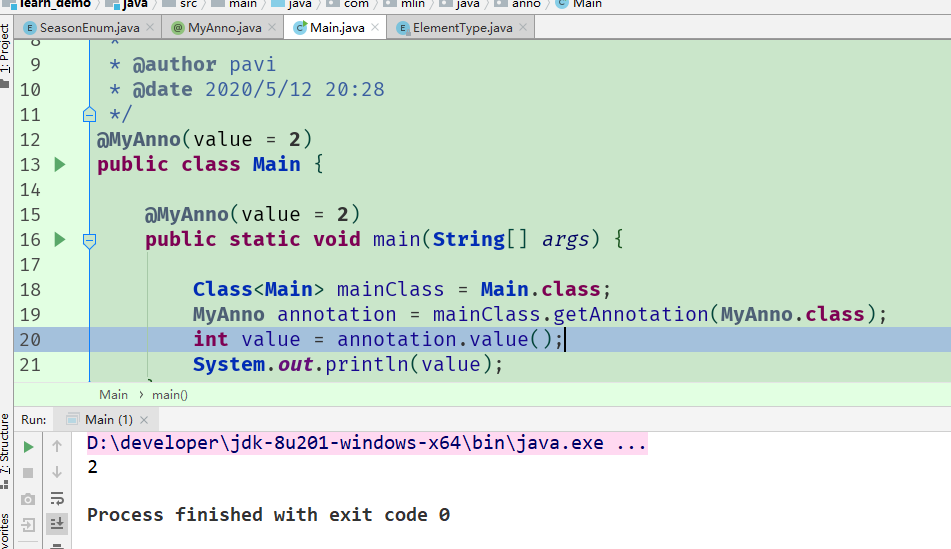自定义注解
自定义注解
1. 元注解
元注解:用于修饰注解。
四种元注解:
① @Retention: 只能用于修饰一个 Annotation 定义, 用于指定该 Annotation 的生命周期, @Rentention 包含一个 RetentionPolicy 类型的成员变量。
RetentionPolicy.SOURCE:在源文件中有效;
RetentionPolicy.CLASS:在class文件中有效;
RetentionPolicy.RUNTIME:在运行时有效;
②@Target: 用于修饰 Annotation 定义, 用于指定被修饰的 Annotation 能用于修饰哪些程序元素。我的理解是可以在哪里使用这个注解。
public enum ElementType {
/** Class, interface (including annotation type), or enum declaration */
TYPE,
/** Field declaration (includes enum constants) */
FIELD,
/** Method declaration */
METHOD,
/** Formal parameter declaration */
PARAMETER,
/** Constructor declaration */
CONSTRUCTOR,
/** Local variable declaration */
LOCAL_VARIABLE,
/** Annotation type declaration */
ANNOTATION_TYPE,
/** Package declaration */
PACKAGE,
/**
* Type parameter declaration
*
* @since 1.8
*/
TYPE_PARAMETER, //任何类型变量的声明语句中
/**
* Use of a type
*
* @since 1.8
*/
TYPE_USE //使用类型的任何语句中
}
③@Documented: 用于指定被该元 Annotation 修饰的 Annotation 类将被javadoc 工具提取成文档。默认情况下,javadoc是不包括注解的。
④@Inherited: 被它修饰的 Annotation 将具有继承性。如果某个类使用了被@Inherited 修饰的 Annotation, 则其子类将自动具有该注解。
2.自定义注解
注解如下:
@Target({ElementType.METHOD,ElementType.TYPE}) //可在方法和类中使用它
@Retention(RetentionPolicy.RUNTIME) //运行时有效
public @interface MyAnno {
int value() default 1;
}
使用注解:
@MyAnno(value = 2)
public class Main {
@MyAnno(value = 2)
public static void main(String[] args) {
Class<Main> mainClass = Main.class;
MyAnno annotation = mainClass.getAnnotation(MyAnno.class);
int value = annotation.value(); //获取注解的值
System.out.println(value);
}
}
运行截图:

作者:pavi
出处:http://www.cnblogs.com/pavi/
本文版权归作者和博客园所有,欢迎转载。转载请在留言板处留言给我,且在文章标明原文链接,谢谢!
如果您觉得本篇博文对您有所收获,觉得我还算用心,请点击右下角的 [推荐],谢谢!


 浙公网安备 33010602011771号
浙公网安备 33010602011771号